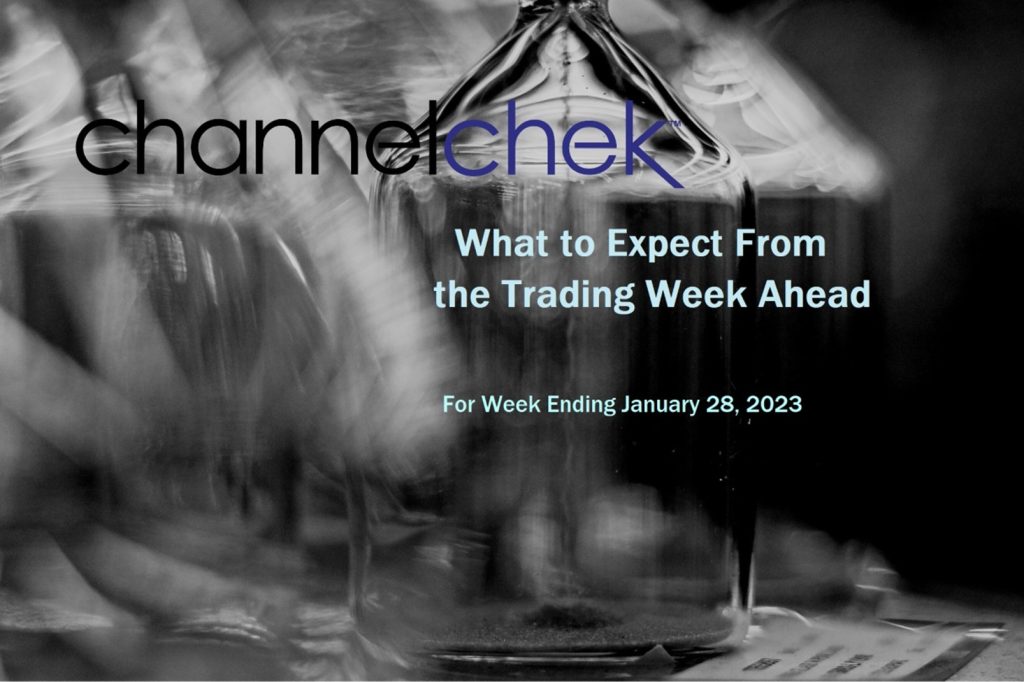
With a Light Week Ahead for Economic Reports, Investors Eye Big-Tech Earnings
In contrast to recent weeks, which began quietly as investors waited on late-week releases (i.e.: inflation, Beige Book, Fed announcements, etc.) before getting involved, this week is relatively quiet for economic reports. With less to be concerned about undermining any new positions, early week activity, without a holiday, may help increase volume. The scarcity of economic numbers could also cause more attention to be paid to earnings reports. This coming week we’ll receive a slew of big tech companies reporting. Disappointment may cause tech, which is showing signs of life early in 2023, to fall behind again. Whereas surprises on the upside could help unwind some of last year’s dismal big tech performance. Small Cap stocks, for their part, are keeping pace with the Nasdaq 100 mega stocks.
Earnings of both small-caps and mega-caps this week may produce a clear front-running segment based on capitalization.
There’s a Fed meeting next week. While the consensus seems to be for a 25 bp hike, Fed governors have been clear in recent addresses that the tightening cycle is not over. The PCE number late this week is considered the Fed’s favorite inflation gauge. There are no scheduled addresses by Fed regional presidents leading up to the two-day meeting that concludes on February 1.
Monday 1/23
- 8:30 AM ET The index of leading economic indicators, which has been in steep decline (dropped a full 1.0 percent in November), is expected to have fallen a further 0.7 percent in December. The index of leading economic indicators is a composite of 10 forward-looking components, including building permits, new factory orders, stock market performance, and unemployment claims. As such, estimates pre-report tend to be very close to the actual number. The report attempts to predict general economic conditions six months out.
Tuesday 1/24
- 9:45 AM ET, The Purchasing Managers Index (PMI) has been drifting down further into contraction – no relief is expected for January. Manufacturing is seen at 46.5 with services at 45.5.
Wednesday 1/25
- 7:00 AM ET, the Mortgage Bankers’ Association (MBA) compiles various mortgage loan indexes. The purchase applications index measures applications at mortgage lenders. This is a leading indicator for single-family home sales and housing construction. The composite index is expected to come in at 27.9%, while the Purchase applications are expected to show a reading of 24.7%. The data provides a gauge of not only the demand for housing but economic momentum.
Thursday 1/26
- 8:30 AM ET, Forecasters see Durable Goods Orders rebounding 2.8 percent in December, which would more than reverse November’s steep 2.1 percent decline. Yet the gain is seen concentrated in aircraft as both ex-transportation and core capital goods orders are seen falling 0.2 percent.
- 8:30 AM ET, Gross Domestic Product, or GDP for the fourth quarter is expected to have slowed to a 2.7% annualized growth versus third-quarter growth of 3.2%. Positive growth would indicate that the economy is not in a recession.
- 8:30 AM ET, Jobless Claims are a weekly report. For the January 21 week, it is expected to come in at 202,000 versus a very low 190,000 in the prior week. The Fed focuses on jobs; the very strong numbers (low) suggest the Fed has room to tighten without being overly disruptive to job creation. Also, a tight labor market can be viewed as inflationary.
- 10:00 AM ET, New Home Sales in December are expected to revert to the downward trend at a 614,000 annualized rate versus November’s 640,000. Higher home sales reverberate throughout the economy in terms of spending and growth.
Friday 1/27
• 8:30 AM ET, Personal Income is expected to have increased a monthly 0.2 percent higher in December, with consumption expenditures expected to have decreased 0.1 percent. These would compare with respective November gains of 0.4 and 0.1 percent.
The PCE inflation readings for December, which are part of the PI numbers, are expected to show no change overall and up 0.3 percent for the core (versus respective gains of 0.1 and 0.2 percent) for annual rates of 5.0 and 4.4 percent (versus November’s 5.5 and 4.7 percent).
What Else
The Federal Reserve is very likely through most of its overnight Fed Funds tightening cycle. Japan, which had gone through decades of having a deflation problem, is now experiencing the highest inflation in 41 years. The Bank of Japan has not adopted the aggressively hawkish monetary policy that the US has. The US central bank, chaired by Jerome Powell, must be looking on and holding his stated opinion that he’d rather do too much tightening than too little.
Managing Editor, Channelchek